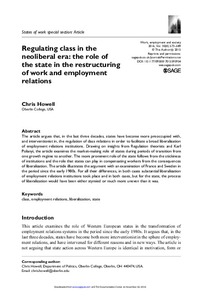Regulating class in the neoliberal era: the role of the state in the restructuring of work and employment relations

2016
30
4
August
573-589
labour relations ; State ; state intervention
Labour relations
http://dx.doi.org/10.1177/0950017015595954
English
Bibliogr.
"The article argues that, in the last three decades, states have become more preoccupied with, and interventionist in, the regulation of class relations in order to facilitate a broad liberalization of employment relations institutions. Drawing on insights from Regulation theorists and Karl Polanyi, the article examines the market-making role of states during periods of transition from one growth regime to another. The more prominent role of the state follows from the stickiness of institutions and the role that states can play in compensating workers from the consequences of liberalization. The article illustrates the argument with an examination of France and Sweden in the period since the early 1980s. For all their differences, in both cases substantial liberalization of employment relations institutions took place and in both cases, but for the state, the process of liberalization would have been either stymied or much more uneven than it was."
Digital
The ETUI is co-funded by the European Union. Views and opinions expressed are however those of the author(s) only and do not necessarily reflect those of the European Union or the ETUI.